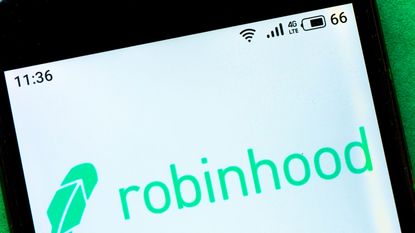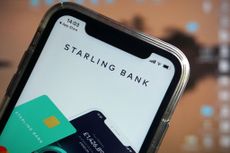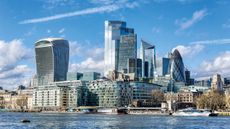Robinhood is going public – should you invest?
Online stockbroking app Robinhood is going public on the US stock exchange. Saloni Sardana looks at whether it's worth a punt.


Online stockbroking app Robinhood is going public, but it may already be bracing itself for a lacklustre start.
Robinhood is due to trade later today under the symbol “HOOD” on the Nasdaq exchange, marking the seventh biggest public listing (also known as an initial public offering, or IPO) to take place on a US exchange in 2021. It is looking to raise $2.1bn.
On Wednesday the company sold 55 million shares at $38 each. That is at the low end of the range of $38-$42 it was targeting, and gives it a market valuation of around $33bn
Subscribe to MoneyWeek
Subscribe to MoneyWeek today and get your first six magazine issues absolutely FREE

Sign up to Money Morning
Don't miss the latest investment and personal finances news, market analysis, plus money-saving tips with our free twice-daily newsletter
Don't miss the latest investment and personal finances news, market analysis, plus money-saving tips with our free twice-daily newsletter
It is clear from the price Robinhood opted for that investors are probably not scrambling to buy into the company. But, as Bloomberg puts it: “a lower price in the IPO could allow more room for the “first-day pop” craved by investors when the stock begins trading Thursday.”
Robinhood’s co-founders, Vlad Tenev (who is also the firm’s chief executive and creative officer) and Baiju Bhatt will between them hold most of the voter power and rights in the company.
But what is Robinhood?
Robinhood was set up in 2013 and is a middle man, a broker-dealer which allows private investors to buy and sell shares. But it is a unique middle-man: it is backed by the US Securities and Exchange Commission and by FINRA, which is part of the Securities Investor Protection Corporation.
It revolutionised the brokerage industry and gave birth to mobile share trading, making it much more convenient, particularly for amateur investors, to purchase derivatives, something which was difficult until a few years ago.
It also pioneered the zero-fee business model. Normally, broker-dealers earn money by setting a commission in the form of direct fees to customers. This often deterred investors from buying stocks, but Robinhood’s business model – known as “payment for order flow” (PFOF) – allowed Robinhood to make money by charging market makers in return for directing customers’ trades to their trading desks. This paved the way for other brokerages to embrace the business model and slash fees.
The zero-feel model has helped several day-traders enter the market and is at the heart of the retail market frenzy that started last year as amateur investors – many using their government stimulus cheques – flocked to the app to make money during heights of market volatility, punting on “meme” stocks such as GameStop.
But the company was criticised during the meme stock frenzy earlier in January this year, when several retail investors came together on forums such as “wallstreetbets” on the social media platform Reddit.
The flurry in trading in those meme stocks triggered higher deposit limits at its clearing house. This led to a ten times higher deposit requirement for the broker’s equities trading.
Robinhood had to get emergency funding and put curbs on a number of volatile stocks.
Robinhood was then forced to raise billions of dollars from its backers to prevent liquidity problems.
Another sore spot relating to that episode was the fact Robinhood blocked the purchases of stocks such as AMC, Gamestop and others just after the Reddit-sparked rallies. It told its clients they would still be able to close out positions in many of these volatile stocks but could not buy any additional stocks. Robinhood’s critics said this amounted to market manipulation.
But despite the negative publicity, Robinhood remains a strong growth stock, and has raised $5.6bn via 23 separate funding rounds since it was founded, according to Crunchbase.
For retail investors, Robinhood’s IPO may be particularly attractive as it is making just over a third of its shares available to buy directly through the app. This is rare for IPOs, which normally put aside reserve shares for institutional buyers.
So should you invest?
Forbes doesn’t recommend it, and says: “With its rapid growth slowing down, investors should be concerned about talk of a regulatory crackdown on major components of its revenue.”
The SEC is also exploring the trade in meme cryptocurrency dogecoin, which has risen by almost 6000% in the last year without any fundamental reason or value. Depending on the outcome, it could hurt Robinhood because of its reliance on cryptocurrency revenue as dogecoin alone accounts for 6% of Robinhood’s revenue, reports CNBC.
Robinhood is also prone to further regulations on its PFOF revenue model. While it accounted for 81% of Robinhood’s revenue in the past quarter, SEC Chairman Gary Gensler is scrutinising the model due to potential conflict it poses to brokers.
It also still faces 50 class action legal cases from the GameStop saga, 15 cases from application outages in March of last year as well as cases stemming from its PFOF model.
So if your risk appetite is big, then by all means invest in Robinhood. But as The Motley Fool puts it, while it remains uncertain how badly these lawsuits could harm Robinhood, “they do add another layer of risk to anyone thinking of investing in the company”.
Saloni is a web writer for MoneyWeek focusing on personal finance and global financial markets. Her work has appeared in FTAdviser (part of the Financial Times), Business Insider and City A.M, among other publications. She holds a masters in international journalism from City, University of London.
Follow her on Twitter at @sardana_saloni
-
-
 Top-quality small companies with big scope for long-term growth
Top-quality small companies with big scope for long-term growthA professional investor tells us where he’d put his money. This week: Dr Gareth Blades, analyst at Amati Global Investors, highlights three favourites.
By Nicole García Mérida Published
-
 Starling Bank hikes fixed savings rate to 5.25%
Starling Bank hikes fixed savings rate to 5.25%Starling Bank has hiked the rate on its fixed savings which has shot up from 3.25% to 5.25% - but how does it compare to the rest of the market?
By Vaishali Varu Published
-
 Investing in wine: how Cru Wine is reaching new audiences
Investing in wine: how Cru Wine is reaching new audiencesTips Gregory Swartberg, founder of fine wine specialist Cru Wine, talks to Chris Carter about how to start a wine collection
By Chris Carter Published
-
 Small companies with big potential
Small companies with big potentialMichael Taylor of Shifting Shares reviews his 2023 picks and highlights more promising minnows.
By Michael Taylor Published
-
 The MoneyWeek portfolio of investment trusts – July 2023 update
The MoneyWeek portfolio of investment trusts – July 2023 updateTips A decade ago we set up the MoneyWeek portfolio of investment trusts. They remain a compelling long-term bet says Rupert Hargreaves
By Rupert Hargreaves Published
-
 Women lead the way with ethical investments
Women lead the way with ethical investmentsDemand for more ethical investments has soared – and women are more likely to opt for them. Annabelle Williams, personal finance specialist at Nutmeg, takes a look at why.
By Annabelle Williams Published
-
 BoE: Mortgage payments to rise by £220 a month for households
BoE: Mortgage payments to rise by £220 a month for householdsMillions of households can expect a mortgage spike of around £200 a month - and some may even reach a extra £1,000 a month, the Bank of England warns
By Marc Shoffman Published
-
 What happened to Thames Water?
What happened to Thames Water?Thames Water, the UK’s biggest water company could go under due to mismanagement and debt. We look into how the company got itself into this position, and what investors should expect.
By Simon Wilson Last updated
-
 Where to invest in the metals that will engineer the energy transition
Where to invest in the metals that will engineer the energy transitionA professional investor tells us where he’d put his money. This week: John Ciampaglia, manager of the Sprott Energy Transition Materials UCITS ETF.
By Nicole García Mérida Published
-
 How investors can profit from high food prices
How investors can profit from high food pricesThe latest furore over grocery prices will die down, says David Stevenson. But the long-term outlook for soft commodities remains bullish. These are the stocks investors can buy to profit from high food prices.
By David J Stevenson Published









